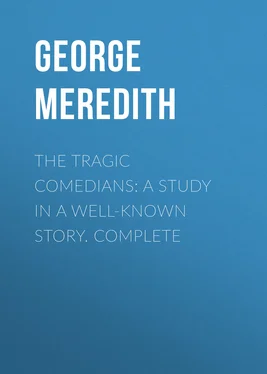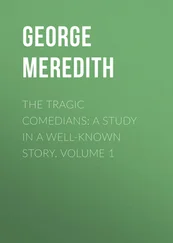George Meredith - The Tragic Comedians - A Study in a Well-known Story. Complete
Здесь есть возможность читать онлайн «George Meredith - The Tragic Comedians - A Study in a Well-known Story. Complete» — ознакомительный отрывок электронной книги совершенно бесплатно, а после прочтения отрывка купить полную версию. В некоторых случаях можно слушать аудио, скачать через торрент в формате fb2 и присутствует краткое содержание. Жанр: foreign_dramaturgy, literature_19, Драматургия, foreign_antique, foreign_prose, на английском языке. Описание произведения, (предисловие) а так же отзывы посетителей доступны на портале библиотеки ЛибКат.
- Название:The Tragic Comedians: A Study in a Well-known Story. Complete
- Автор:
- Жанр:
- Год:неизвестен
- ISBN:нет данных
- Рейтинг книги:4 / 5. Голосов: 1
-
Избранное:Добавить в избранное
- Отзывы:
-
Ваша оценка:
- 80
- 1
- 2
- 3
- 4
- 5
The Tragic Comedians: A Study in a Well-known Story. Complete: краткое содержание, описание и аннотация
Предлагаем к чтению аннотацию, описание, краткое содержание или предисловие (зависит от того, что написал сам автор книги «The Tragic Comedians: A Study in a Well-known Story. Complete»). Если вы не нашли необходимую информацию о книге — напишите в комментариях, мы постараемся отыскать её.
The Tragic Comedians: A Study in a Well-known Story. Complete — читать онлайн ознакомительный отрывок
Ниже представлен текст книги, разбитый по страницам. Система сохранения места последней прочитанной страницы, позволяет с удобством читать онлайн бесплатно книгу «The Tragic Comedians: A Study in a Well-known Story. Complete», без необходимости каждый раз заново искать на чём Вы остановились. Поставьте закладку, и сможете в любой момент перейти на страницу, на которой закончили чтение.
Интервал:
Закладка:
Prince Marko did what he could to please her; he knew something of the rumours about Alvan and the baroness. But why should his lady trouble herself for particulars of such people, whom it could scarcely be supposed she would meet by accident? He asked her this. Clotilde said it was common curiosity. She read him a short lecture on the dismal narrowness of their upper world; and on the advantage of taking an interest in the world below them and more enlightened; a world where ideas were current and speech was wine. The prince nodded; if she had these opinions, it must be good for him to have them too, and he shared them, as it were, by the touch of her hand, and for the length of time that he touched her hand, as an electrical shock may be taken by one far removed from the battery, susceptible to it only through the link; he was capable of thinking all that came to him from her a blessing—shocks, wounds and disruptions. He did not add largely to her stock of items, nor did he fetch new colours. The telegraph wire was his model of style. He was more or less a serviceless Indian Bacchus, standing for sign of the beauty and vacuity of their world: and how dismally narrow that world was, she felt with renewed astonishment at every dive out of her gold-fish pool into the world of tides below; so that she was ready to scorn the cultivation of the graces, and had, when not submitting to the smell, fanciful fits of a liking for tobacco smoke—the familiar incense of those homes where speech was wine.
At last she fell to the asking of herself whether, in the same city with him, often among his friends, hearing his latest intimate remarks—things homely redolent of him as hot bread of the oven—she was ever to meet this man upon whom her thoughts were bent to the eclipse of all others. She desired to meet him for comparison’s sake, and to criticize a popular hero. It was inconceivable that any one popular could approach her standard, but she was curious; flame played about him; she had some expectation of easing a spiteful sentiment created by the recent subjection of her thoughts to the prodigious little Jew; and some feeling of closer pity for Prince Marko she had, which urged her to be rid of her delusion as to the existence of a wonder-working man on our earth, that she might be sympathetically kind to the prince, perhaps compliant, and so please her parents, be good and dull, and please everybody, and adieu to dreams, good night, and so to sleep with the beasts!…
Calling one afternoon on a new acquaintance of the flat table-land she liked tripping down to from her heights, Clotilde found the lady in supreme toilette, glowing, bubbling: ‘Such a breakfast, my dear!’ The costly profusion, the anecdotes, the wit, the fun, the copious draughts of the choicest of life—was there ever anything to match it? Never in that lady’s recollection, or her husband’s either, she exclaimed. And where was the breakfast? Why, at Alvan’s, to be sure; where else could such a breakfast be?
‘And you know Alvan!’ cried Clotilde, catching excitement from the lady’s flush.
‘Alvan is one of my husband’s closest friends’
Clotilde put on the playful frenzy; she made show of wringing her hands: ‘Oh! happy you! you know Alvan? And everybody is to know him except me? why? I proclaim it unjust. Because I am unmarried? I’ll take a husband to-morrow morning to be entitled to meet Alvan in the evening.’
The playful frenzy is accepted in its exact innocent signification of ‘this is my pretty wilful will and way,’ and the lady responded to it cordially; for it is pleasant to have some one to show, and pleasant to assist some one eager to see: besides, many had petitioned her for a sight of Alvan; she was used to the request.
‘You’re not obliged to wait for to-morrow,’ she said. ‘Come to one of our gatherings to-night. Alvan will be here.’
‘You invite me?’
‘Distinctly. Pray, come. He is sure to be here. We have his promise, and Alvan never fails. Was it not Frau v. Crestow who did us the favour of our introduction? She will bring you.’
The Frau v. Crestow was a cousin of Clotilde’s by marriage, sentimental, but strict in her reading of the proprieties. She saw nothing wrong in undertaking to conduct Clotilde to one of those famous gatherings of the finer souls of the city and the race; and her husband agreed to join them after the sitting of the Chamber upon a military-budget vote. The whole plan was nicely arranged and went well. Clotilde dressed carefully, letting her gold-locks cloud her fine forehead carelessly, with finishing touches to the negligence, for she might be challenged to take part in disputations on serious themes, and a handsome young woman who has to sustain an argument against a man does wisely when she forearms her beauties for a reserve, to carry out flanking movements if required. The object is to beat him.
CHAPTER III
Her hostess met her at the entrance of the rooms, murmuring that Alvan was present, and was there: a direction of a nod that any quick-witted damsel must pretend to think sufficient, so Clotilde slipped from her companion and gazed into the recess of a doorless inner room, where three gentlemen stood, backed by book cases, conversing in blue vapours of tobacco. They were indistinct; she could see that one of them was of good stature. One she knew; he was the master of the house, mildly Jewish. The third was distressingly branded with the slum and gutter signs of the Ahasuerus race. Three hats on his head could not have done it more effectively. The vindictive caricatures of the God Pan, executed by priests of the later religion burning to hunt him out of worship in the semblance of the hairy, hoofy, snouty Evil One, were not more loathsome. She sank on a sofa. That the man? Oh! Jew, and fifty times over Jew! nothing but Jew!
The three stepped into the long saloon, and she saw how veritably magnificent was the first whom she had noticed.
She sat at her lamb’s-wool work in the little ivory frame, feeding on the contrast. This man’s face was the born orator’s, with the light-giving eyes, the forward nose, the animated mouth, all stamped for speechfulness and enterprise, of Cicero’s rival in the forum before he took the headship of armies and marched to empire.
The gifts of speech, enterprise, decision, were marked on his features and his bearing, but with a fine air of lordly mildness. Alas, he could not be other than Christian, so glorious was he in build! One could vision an eagle swooping to his helm by divine election. So vigorously rich was his blood that the swift emotion running with the theme as he talked pictured itself in passing and was like the play of sheet lightning on the variations of the uninterrupted and many-glancing outpour. Looking on him was listening. Yes, the looking on him sufficed. Here was an image of the beauty of a new order of godlike men, that drained an Indian Bacchus of his thin seductions at a breath-reduced him to the state of nursery plaything, spangles and wax, in the contemplation of a girl suddenly plunged on the deeps of her womanhood. She shrank to smaller and smaller as she looked.
Be sure that she knew who he was. No, says she. But she knew. It terrified her soul to think he was Alvan. She feared scarcely less that it might not be he. Between these dreads of doubt and belief she played at cat and mouse with herself, escaped from cat, persecuted mouse, teased herself, and gloated. It is he! not he! he! not he! most certainly! impossible!—And then it ran: If he, oh me! If another, woe me! For she had come to see Alvan. Alvan and she shared ideas. They talked marvellously alike, so as to startle Count Kollin: and supposing he was not Alvan, it would be a bitter disappointment. The supposition that he was, threatened her with instant and life-long bondage.
Читать дальшеИнтервал:
Закладка:
Похожие книги на «The Tragic Comedians: A Study in a Well-known Story. Complete»
Представляем Вашему вниманию похожие книги на «The Tragic Comedians: A Study in a Well-known Story. Complete» списком для выбора. Мы отобрали схожую по названию и смыслу литературу в надежде предоставить читателям больше вариантов отыскать новые, интересные, ещё непрочитанные произведения.
Обсуждение, отзывы о книге «The Tragic Comedians: A Study in a Well-known Story. Complete» и просто собственные мнения читателей. Оставьте ваши комментарии, напишите, что Вы думаете о произведении, его смысле или главных героях. Укажите что конкретно понравилось, а что нет, и почему Вы так считаете.












